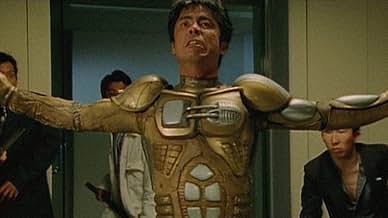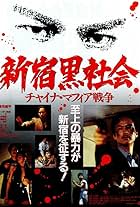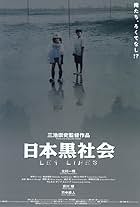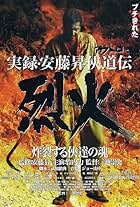VALUTAZIONE IMDb
6,0/10
1943
LA TUA VALUTAZIONE
Un gangster inesperto viene ucciso insieme al suo capo forte e rispettato e si risveglia scoprendo che uno scienziato pazzo gli ha dato un nuovo corpo composto da parti del suo capo e da par... Leggi tuttoUn gangster inesperto viene ucciso insieme al suo capo forte e rispettato e si risveglia scoprendo che uno scienziato pazzo gli ha dato un nuovo corpo composto da parti del suo capo e da parti bioniche indistruttibili.Un gangster inesperto viene ucciso insieme al suo capo forte e rispettato e si risveglia scoprendo che uno scienziato pazzo gli ha dato un nuovo corpo composto da parti del suo capo e da parti bioniche indistruttibili.
- Regia
- Sceneggiatura
- Star
Trama
Lo sapevi?
- ConnessioniReferences Il cervello che non voleva morire (1962)
Recensione in evidenza
Japanese film maker talent and inventive genius Takashi Miike (born 1960) has done incredible amount of films in his not-even-so-long career so far. He has done made-for-video cheapies and big screen films that vary from unconventional and wonderful Yakuza tales to insane comic book adaptations to mind blowing satires, and the greater the themes in these films are, the more serious he is and uses his ideas and crazy creativity with restraint inside the otherwise serious world he's created: a bazooka torn from a guy's back isn't any funny moment in Dead or Alive (1999) but has its important meaning for the theme telling so much about the character(s) and their values in the violent world Miike depicts.
His Full Metal Yakuza aka Full Metal Gokudo (1997) belongs to the cheap and fastly made video films and it is easy to tell it is a very exploitation oriented market that wants simple, violent and graphic films without much more merits in them. Full Metal Yakuza tells the Robocop-like (1987, Paul Verhoeven) story of a killed Yakuza who gets back to life as he is turned into a robot/human by one crazy scientist. He wants to avenge the death of his friend as well as try to save his former love from the sadistic hands of the rival Yakuza. Ultra violence and gore ensues and all the potential that was used to wonderful perfection in Fudoh (1996), for example, is not there in this film.
There are some nice Japanese cinema elements like the silence that tells more than words. The scene in the beach after a refusal to kill one Yakuza boss is especially memorable and also close to the work of Takeshi Kitano. Still the revenge theme is not handled here as it was in Dead or Alive or Fudoh. In Full Metal Yakuza, violence and acts of revenge don't have any other meaning than to satisfy the gore audience and that is pretty sad for those who'd like to see Miike making more serious cinema all the time. In real world, violence and revenge is never as harmless and fun as in this film and Miike for sure would have talents to make real films from the subject matter, as he's done. Also the ending, showing how desperate the characters are for personal revenge and payback would be as wonderful as in those other films, but now it all is just mostly comical trash as Miike definitely wasn't doing this for anything else than money and to satisfy his huge need to work. It is hard to make any interpretations on single images and scenes while everything before and after them fights against any serious analyzes.
The film is high on its gore level and so reminds pretty much of Ichi the Killer, a film that is filled with cartoonish violence and blood plus sadism towards both females and males. Full Metal Yakuza has plenty of swordfights (!) and other bloody carnage that gives the makers an opportunity to throw in plenty of blood geysirs and splatter that satisfies some viewers but is not enough when the film is by talented director like Miike. Neither this or Ichi the Killer are to be taken seriously (hardly anyone takes, at least Full Metal Yakuza), and especially Ichi, despite its flaws and negative sides, tells something about the audience, that laughs looking like a bunch of monkeys and as sorry characters as those inside the film, when someone's being tortured and brutally murdered. Ichi the Killer has also some interesting elements in the form of Ichi himself, who is a traumatized boy with violent environment and society around him. This important theme is handled more carefully in Rainy Dog and also in Fudoh.
His Full Metal Yakuza aka Full Metal Gokudo (1997) belongs to the cheap and fastly made video films and it is easy to tell it is a very exploitation oriented market that wants simple, violent and graphic films without much more merits in them. Full Metal Yakuza tells the Robocop-like (1987, Paul Verhoeven) story of a killed Yakuza who gets back to life as he is turned into a robot/human by one crazy scientist. He wants to avenge the death of his friend as well as try to save his former love from the sadistic hands of the rival Yakuza. Ultra violence and gore ensues and all the potential that was used to wonderful perfection in Fudoh (1996), for example, is not there in this film.
There are some nice Japanese cinema elements like the silence that tells more than words. The scene in the beach after a refusal to kill one Yakuza boss is especially memorable and also close to the work of Takeshi Kitano. Still the revenge theme is not handled here as it was in Dead or Alive or Fudoh. In Full Metal Yakuza, violence and acts of revenge don't have any other meaning than to satisfy the gore audience and that is pretty sad for those who'd like to see Miike making more serious cinema all the time. In real world, violence and revenge is never as harmless and fun as in this film and Miike for sure would have talents to make real films from the subject matter, as he's done. Also the ending, showing how desperate the characters are for personal revenge and payback would be as wonderful as in those other films, but now it all is just mostly comical trash as Miike definitely wasn't doing this for anything else than money and to satisfy his huge need to work. It is hard to make any interpretations on single images and scenes while everything before and after them fights against any serious analyzes.
The film is high on its gore level and so reminds pretty much of Ichi the Killer, a film that is filled with cartoonish violence and blood plus sadism towards both females and males. Full Metal Yakuza has plenty of swordfights (!) and other bloody carnage that gives the makers an opportunity to throw in plenty of blood geysirs and splatter that satisfies some viewers but is not enough when the film is by talented director like Miike. Neither this or Ichi the Killer are to be taken seriously (hardly anyone takes, at least Full Metal Yakuza), and especially Ichi, despite its flaws and negative sides, tells something about the audience, that laughs looking like a bunch of monkeys and as sorry characters as those inside the film, when someone's being tortured and brutally murdered. Ichi the Killer has also some interesting elements in the form of Ichi himself, who is a traumatized boy with violent environment and society around him. This important theme is handled more carefully in Rainy Dog and also in Fudoh.
I più visti
Accedi per valutare e creare un elenco di titoli salvati per ottenere consigli personalizzati
Dettagli
- Tempo di esecuzione1 ora 42 minuti
- Colore
Contribuisci a questa pagina
Suggerisci una modifica o aggiungi i contenuti mancanti




















